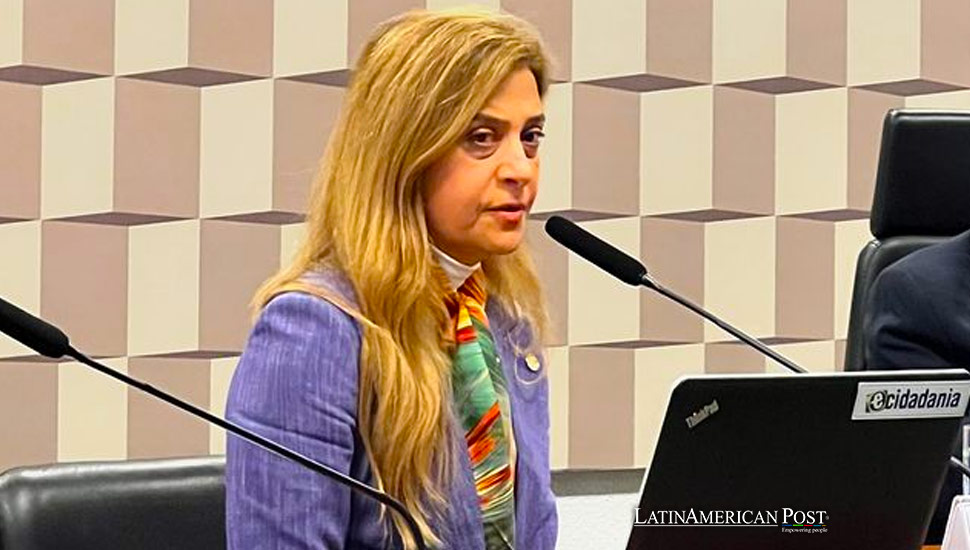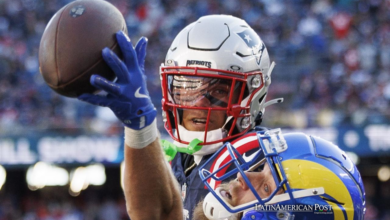Brazilian Football Faces Controversy as Palmeiras Seeks Botafogo Owner Expulsion

Palmeiras President Leila Pereira has made a grave accusation, calling for the expulsion of Botafogo owner John Textor from Brazilian football. She alleges that his accusations of match-fixing not only undermine the sport’s integrity and credibility but also pose a significant threat to the very essence of Brazilian football.
In a heated session before a Brazilian Senate committee investigating irregularities in football, Palmeiras President Leila Pereira made a bold demand: the expulsion of John Textor, the American owner of Botafogo. Pereira’s call came in response to Textor’s controversial claims that Palmeiras’ victories were marred by match-fixing, shaking the foundations of Brazilian football.
Textor alleged that a match between Palmeiras and São Paulo last year, where Palmeiras won 5-0, was manipulated by five São Paulo players. He has implanted similar misconduct in other games won by Palmeiras, which claimed the national title in 2023 after Botafogo, the long-time leader, faltered in the season’s final stages. These allegations, if proven, could have severe implications for the integrity of Brazilian football, raising questions about the fairness of the competition and the trustworthiness of the players and officials involved.
These accusations have not only tarnished Palmeiras’ reputation but also cast a shadow over the integrity of Brazilian football. Addressing the Senate committee, Pereira expressed her deep respect for Botafogo but condemned Textor’s unsubstantiated allegations. “It’s unacceptable for a foreigner to come to Brazil and cast doubts on our clubs without any proof, simply because his team failed to win the title,” Pereira stated. The controversy has strained the relationship between the two clubs, potentially complicating the resolution of the issue.
The Impact on Brazilian Football
Pereira warned that Textor’s “irresponsible accusations” damage Palmeiras and undermine Brazilian football’s credibility. This sport is a significant cultural and economic asset to the country. Textor, a controversial figure in the football world, who also owns Olympique de Lyon in France and recently sold his shares in England’s Crystal Palace, has a history of controversies and has faced sanctions for offenses against Brazilian referees. His past actions and behavior raise questions about the credibility of his current allegations.
In his defense, Textor presented the Senate committee with reports from a French company that uses technology to analyze the behavior of players and referees, purportedly to support his claims. However, Pereira dismissed these reports as unfounded and revealed that Palmeiras had initiated legal actions against Textor in civil, criminal, and sports courts.
Pereira firmly believes that if Textor cannot provide concrete evidence, he should be expelled from Brazilian football. “If he doesn’t prove anything, and there is absolutely no proof so far, he must be expelled from Brazilian football. Penalties need to be severe to be effective,” she asserted. The potential expulsion from Brazilian football could have significant personal and professional consequences for Textor, affecting his reputation and future business ventures in the sport.
The Senate committee, chaired by former footballer and Senator Romário de Souza Faria, was established in April to investigate various allegations of fraud and match-fixing involving players, officials, and betting companies. The committee’s role underscores the severe nature of these accusations and the broader implications for Brazilian football. Its findings could lead to significant changes in the regulation and governance of the sport, depending on the credibility and weight of the evidence presented.
Football in Brazil is more than just a sport; it is a cultural phenomenon deeply embedded in the nation’s identity. The country’s love affair with football dates back to the early 20th century when British expatriates introduced the sport. Over the decades, Brazil has produced some of the greatest footballers in history and has won the FIFA World Cup a record five times. The sport also plays a crucial role in the country’s economy, generating significant revenue and creating jobs, making the controversy’s potential impact on Brazilian football all the more significant.
However, Brazilian football has not been immune to scandals. The sport has faced numerous challenges, from corruption within the Brazilian Football Confederation (CBF) to match-fixing scandals in the domestic leagues. These controversies have often mirrored the country’s broader issues of corruption and political instability.
The Role of International Owners
The entry of international investors like John Textor into Brazilian football represents a new chapter in the sport’s evolution. While foreign investment can bring financial stability and new opportunities, it also raises questions about these owners’ influence on the sport’s integrity. Textor’s accusations and the subsequent fallout not only affect the domestic football landscape but also have the potential to impact the international perception of Brazilian football, raising concerns about the sport’s credibility and fairness.
The presence of sanctioned officials and controversial figures in Brazilian football management has been a persistent issue. The sport’s governing bodies must navigate these complexities while maintaining the integrity and competitive spirit that make Brazilian football so beloved.
The broader Brazilian football community has responded with a mix of support for Pereira and skepticism about Textor’s motives. Many view Textor’s actions as an attempt to deflect blame for Botafogo’s underperformance. Others see it as a necessary confrontation to address deeper issues within the sport.
For Palmeiras and its fans, the accusations insult the club’s achievements. The 2023 national title was a testament to the team’s skill and determination. Textor’s claims, if left unchallenged, could diminish the value of this accomplishment and erode trust in the fairness of the competition. Moreover, the controversy could lead to severe financial and reputational damage for Palmeiras, and more broadly, it could undermine the trust of fans and stakeholders in the integrity of Brazilian football.
The Future of Brazilian Football
The ongoing investigation by the Senate committee carries immense weight for the future of Brazilian football. The outcome, whether it vindicates Textor’s claims or proves them baseless, could herald a new era for the sport, with stricter regulations or a wave of reforms, respectively.
This situation also underscores the need for transparency and accountability within football’s governing bodies. Ensuring all stakeholders, from club owners to players and officials, adhere to high ethical standards is crucial for maintaining the sport’s integrity.
The controversy surrounding John Textor’s allegations against Palmeiras is a defining moment for Brazilian football. Leila Pereira’s call for his expulsion underscores the seriousness of the issue and the potential damage to the sport’s reputation. As Brazil navigates this challenge, it must balance the need for robust action against misconduct with fairness and due process principles.
Also read: Cuban Fans’ Passion for German Soccer Unites Nations Across Continents
Brazilian football has weathered many storms and emerged stronger each time. This latest controversy, while challenging, presents an opportunity to reinforce the values that make the sport a source of national pride. By addressing these issues head-on and fostering a culture of integrity, Brazilian football can continue to inspire and unite the nation.





